|
Equities continued to crumble under the weight of bad economic data, renewed resource demands of banks and grim forebodings about the earnings season which is about to go into full swing. The picture of a global recession was illuminated this past week as several countries released international trade data. The reports painted a picture of a sharp downturn in trade with both exports and imports declining. And to drive home the point of weakness, European industrial production data continue to show that the bottom is falling out of the economy. Fragile investor sentiment reeled under the steady bombardment of negative corporate and economic news. And although equities in Asia and Europe were lifted by the news that the Bank of America would receive another injection of cash and that the U.S. Congress had released the remaining TARP funds, it did not carry through to North American indexes.
Standard & Poor’s cut Greece’s credit rating and followed recent threats by the agency to downgrade Ireland, Portugal and Spain. This in turn triggered a widening of interest rate spreads between Germany and countries on the periphery of the eurozone. The euro was pressured and investors fled to the safety of the yen and the dollar.
Every major world stock index is now down for 2009. Data from across the world show that the global economy is in trouble. The slowdown in Chinese exports is alarming, as is the collapse in U.S. retail sales. Once auto sales are excluded, last month’s figures were the worst since the data series started in 1947. But the central issue is the same as last year — the state of the financial sector.
On the week, only the Shanghai Composite was up, gaining 2.6 percent. Losses ranged from 7.8 percent for the Hang Seng to 0.9 percent for the Sensex.
|
|
2008 |
2009 |
% Change |
|
Index |
Dec 31 |
Jan 9 |
Jan 16 |
Week |
Year |
| Asia |
|
|
|
|
|
|
| Australia |
All Ordinaries |
3659.3 |
3680.40 |
3494.90 |
-5.0% |
-4.5% |
| Japan |
Nikkei 225 |
8859.6 |
8836.80 |
8230.15 |
-6.9% |
-7.1% |
|
Topix |
859.2 |
855.02 |
817.89 |
-4.3% |
-4.8% |
| Hong Kong |
Hang Seng |
14387.5 |
14377.44 |
13255.51 |
-7.8% |
-7.9% |
| S. Korea |
Kospi |
1124.5 |
1180.96 |
1135.20 |
-3.9% |
1.0% |
| Singapore |
STI |
1761.6 |
1806.02 |
1730.45 |
-4.2% |
-1.8% |
| China |
Shanghai Composite |
1820.8 |
1904.86 |
1954.44 |
2.6% |
7.3% |
|
|
|
|
|
|
|
| India |
Sensex 30 |
9647.3 |
9406.47 |
9323.59 |
-0.9% |
-3.4% |
| Indonesia |
Jakarta Composite |
1355.4 |
1416.67 |
1363.88 |
-3.7% |
0.6% |
| Malaysia |
KLSE Composite |
876.8 |
919.07 |
896.47 |
-2.5% |
2.2% |
| Philippines |
PSEi |
1872.9 |
1984.88 |
1950.13 |
-1.8% |
4.1% |
| Taiwan |
Taiex |
4591.2 |
4502.74 |
4353.70 |
-3.3% |
-5.2% |
| Thailand |
SET |
450.0 |
459.06 |
435.20 |
-5.2% |
-3.3% |
|
|
|
|
|
|
|
| Europe |
|
|
|
|
|
|
| UK |
FTSE 100 |
4434.2 |
4448.54 |
4147.06 |
-6.8% |
-6.5% |
| France |
CAC |
3218.0 |
3299.50 |
3016.75 |
-8.6% |
-6.3% |
| Germany |
XETRA DAX |
4810.2 |
4783.89 |
4366.28 |
-8.7% |
-9.2% |
|
|
|
|
|
|
|
| North America |
|
|
|
|
|
|
| United States |
Dow |
8776.4 |
8599.2 |
8281.2 |
-3.7% |
-5.6% |
|
NASDAQ |
1577.0 |
1571.6 |
1529.3 |
-2.7% |
-3.0% |
|
S&P 500 |
903.3 |
890.4 |
850.1 |
-4.5% |
-5.9% |
| Canada |
S&P/TSX Comp. |
8987.7 |
9085.2 |
8920.4 |
-1.8% |
-0.7% |
| Mexico |
Bolsa |
22380.3 |
21741.3 |
20325.4 |
-6.5% |
-9.2% |
 Stocks were up Friday after declining for seven consecutive days. However, the FTSE, CAC and DAX were all down for the second week. Particularly hard hit were banking stocks as investors worried about mounting credit losses. Resource stocks did not escape either — energy companies declined as crude oil prices continued to drop. Disappointing economic data continued to pour in from the U.S and Europe. Even though the European Central Bank lowered its policy rate to 2.0 percent, the cut was in line with expectations and had little market impact. Stocks were up Friday after declining for seven consecutive days. However, the FTSE, CAC and DAX were all down for the second week. Particularly hard hit were banking stocks as investors worried about mounting credit losses. Resource stocks did not escape either — energy companies declined as crude oil prices continued to drop. Disappointing economic data continued to pour in from the U.S and Europe. Even though the European Central Bank lowered its policy rate to 2.0 percent, the cut was in line with expectations and had little market impact.
On Friday, equity markets were helped by banking sector gains after U.S. authorities approved the release of further bailout funds. The banking sector provided the main focus in the UK after the Financial Services Authority lifted a ban on short selling in the financial sector that had been put in place at the end of September.
German GDP growth in 2008 expanded but at the weakest pace since 2005. A preliminary report estimates that growth slowed to 1.3 percent from 2.5 percent in the prior year. Workday adjusted GDP was up by 1 percent after a 2.6 percent rise in 2007.
Broader fears about the eurozone economy were triggered by news that Standard & Poor’s had cut Greece’s credit rating. The move followed recent warnings by the agency to downgrade Ireland, Portugal and Spain as well.
European Central Bank does the expected
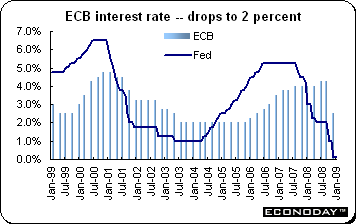 As expected, the European Central Bank lowered its policy interest rate by 50 basis points to 2 percent. It was last at this level in November 2005 after which the ECB began its series of measured increases which culminated in July 2008 at 4.25 percent. The ECB began lowering rates in October 2008 when it participated with other major central banks in lowering interest rates at the height of the financial crisis. Since October, the ECB has lowered rates by 225 basis points. As expected, the European Central Bank lowered its policy interest rate by 50 basis points to 2 percent. It was last at this level in November 2005 after which the ECB began its series of measured increases which culminated in July 2008 at 4.25 percent. The ECB began lowering rates in October 2008 when it participated with other major central banks in lowering interest rates at the height of the financial crisis. Since October, the ECB has lowered rates by 225 basis points.
At the December meeting, ECB president Jean Claude Trichet had signaled his wariness about taking interest rates too low, arguing that the effects of cuts already announced and of government rescue plans should be allowed to work through. But the slide in economic data since then has suggested that the recession will be deep and protracted and appears to have forced a change of mind.
Economic data continue to be dreadful and signal that the economy contracted even more in the fourth quarter than initially expected by analysts. Meanwhile, December’s inflation reading — 1.6 percent on the year — was below the ECB’s definition of price stability (2 percent). But most striking has been the scale of the contraction in industrial output. Eurozone industrial output in November (excluding construction) plummeted 6.9 percent on the year — the biggest such drop since records began in 1990. Industrial production dropped 9 percent in both Italy and France and by 6.5 percent in Germany.
At his post-meeting press conference, Trichet said that the February meeting “is not a relevant one to make a monetary policy decision”. This has led analysts to think that the ECB will pause and hold off on further cuts until March, when new staff projections are expected. Mr Trichet said that further bad economic news had been factored in and the next “important” policy meeting would be in March.
Financial market confidence was hard hit by Standard & Poor’s downgrade of Greece’s credit rating amid threats to mark down other countries too. Bond yields between Germany and other eurozone countries widened dramatically as a result. The gap between the interest rates Spain, Italy, Greece and Portugal must pay investors to borrow for 10 years and the rate charged to Germany has ballooned to the widest since before they joined the euro.
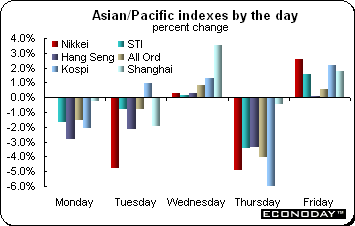 Equity trading ended the week for the most part on a positive note Friday. However, all Asian/Pacific indexes were down for the week with the exception of the Shanghai Composite. News of an additional bailout for Bank of America and Congressional release of additional TARP funds boosted morale and stock prices. The yen eased and helped exporters’ stocks in Japan. However, earlier in the week, a continuing onslaught of gloomy economic data — especially from the U.S. — pushed equities down. On Thursday, awful U.S. retail sales data combined with sinking Japanese machine orders added to the gloom. And banking stocks slid on worries about steeper losses, while resource stocks tumbled on lower commodity and oil prices. Equity trading ended the week for the most part on a positive note Friday. However, all Asian/Pacific indexes were down for the week with the exception of the Shanghai Composite. News of an additional bailout for Bank of America and Congressional release of additional TARP funds boosted morale and stock prices. The yen eased and helped exporters’ stocks in Japan. However, earlier in the week, a continuing onslaught of gloomy economic data — especially from the U.S. — pushed equities down. On Thursday, awful U.S. retail sales data combined with sinking Japanese machine orders added to the gloom. And banking stocks slid on worries about steeper losses, while resource stocks tumbled on lower commodity and oil prices.
On Friday, Bank of Japan governor Masaaki Shirakawa told BoJ branch managers at their quarterly meeting that the Japanese economy is headed for a severe downturn in the near term. Recent economic data have underlined this with industrial production sinking by 8.1 percent in November while machinery orders plunged 16.2 percent. He said the Bank is watching the market closely. Overall, Shirakawa said the high cost of securing loans combined with falling stock markets are causing damage to financial institutions. Furthermore, the environment for commercial paper and corporate bond issuance is deteriorating, as financial conditions tighten at a fast pace.
Following December’s Bank of Japan monetary policy meeting, it was announced the BoJ intended to buy up commercial paper as well as Japanese government bonds to improve market conditions and said they would consider buying up other kinds of corporate debt.
The Shanghai Composite was up on the week led by banking and metal stocks. Speculation that the central bank will cut interest rates yet again helped buoy the market. The index was up by 2.6 percent.
Bank of Thailand cuts by 75 basis points
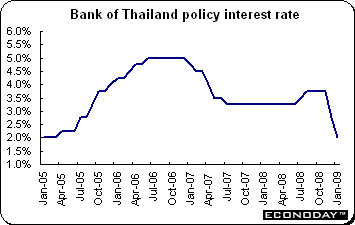 Thailand’s central bank cut its interest rate more than expected for a second month after inflation cooled to the slowest pace in six years and political protests sent confidence plummeting to a record low. The Bank of Thailand lowered its one-day bond repurchase rate by 75 basis points to 2 percent. Thailand joins Indonesia, South Korea and Taiwan in cutting borrowing costs this month as the global recession curtails demand for Asian exports. Exports, which make up 70 percent of the economy, slid in November from a year earlier for the first time since March 2002, sinking 18 percent. Thailand’s central bank cut its interest rate more than expected for a second month after inflation cooled to the slowest pace in six years and political protests sent confidence plummeting to a record low. The Bank of Thailand lowered its one-day bond repurchase rate by 75 basis points to 2 percent. Thailand joins Indonesia, South Korea and Taiwan in cutting borrowing costs this month as the global recession curtails demand for Asian exports. Exports, which make up 70 percent of the economy, slid in November from a year earlier for the first time since March 2002, sinking 18 percent.
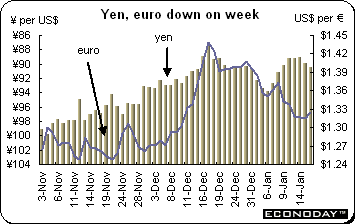 The yen was up and euro down until Friday, when investors rediscovered their appetite for risk and bought equities. The dollar continues to be the safe haven of choice when equities are as volatile as they have been. The euro has been declining primarily because the financial markets think the European Central Bank is behind the curve in cutting interest rates given the floundering economy. Eurozone rates remain among the highest among the world’s major industrialized countries. The ECB rate of 2 percent compares with 1.5 percent in the UK and a range of zero to 0.25 percent in the U.S. The euro also has been affected by the wider sovereign bond spreads for countries such as Spain, Greece, Portugal and Ireland when compared with Germany. The yen was up and euro down until Friday, when investors rediscovered their appetite for risk and bought equities. The dollar continues to be the safe haven of choice when equities are as volatile as they have been. The euro has been declining primarily because the financial markets think the European Central Bank is behind the curve in cutting interest rates given the floundering economy. Eurozone rates remain among the highest among the world’s major industrialized countries. The ECB rate of 2 percent compares with 1.5 percent in the UK and a range of zero to 0.25 percent in the U.S. The euro also has been affected by the wider sovereign bond spreads for countries such as Spain, Greece, Portugal and Ireland when compared with Germany.
On Friday, the yen dropped the most in almost a month against the euro while the dollar declined as measures to stabilize banks reduced demand for the currencies. The yen weakened against all of its major counterparts as the U.S. government agreed to provide $138 billion of funds and guarantees to Bank of America which encouraged investors to sell the yen and buy higher-yielding assets.
The ruble (or rouble) slid to 32.6675 per dollar, the weakest level since Russia redenominated the currency in 1998. Bank Rossii devalued the currency for the fifth time in six days. The ruble hit historic lows against both the dollar and euro Thursday as Russia accelerated a controlled devaluation of the currency to adjust for the collapse in oil prices. Russia has lost more than a quarter of its hard currency reserves since August to combat a run on the ruble which began after Russia’s war with Georgia and accelerated as oil prices sank.
Selected currencies — weekly results
|
|
2008 |
2009 |
% change |
|
|
Dec 31 |
Jan 9 |
Jan 16 |
Week |
2009 |
| U.S. $ per currency |
|
|
|
|
|
|
| Australia |
A$ |
0.686 |
0.703 |
0.673 |
-4.3% |
-5.4% |
| New Zealand |
NZ$ |
0.579 |
0.590 |
0.547 |
-7.3% |
-6.8% |
| Canada |
C$ |
0.819 |
0.840 |
0.801 |
-4.6% |
-2.5% |
| Eurozone |
euro (€) |
1.405 |
1.343 |
1.329 |
-1.0% |
-4.9% |
| UK |
pound sterling (£) |
1.467 |
1.517 |
1.475 |
-2.8% |
1.1% |
|
|
|
|
|
|
|
| Currency per U.S. $ |
|
|
|
|
|
|
| China |
yuan |
6.841 |
6.836 |
6.838 |
0.0% |
-0.2% |
| Hong Kong |
HK$* |
7.750 |
7.757 |
7.758 |
0.0% |
-0.1% |
| India |
rupee |
48.435 |
48.260 |
48.720 |
-0.9% |
-0.1% |
| Japan |
yen |
90.607 |
90.240 |
90.603 |
-0.4% |
0.2% |
| Malaysia |
ringgit |
3.479 |
3.541 |
3.578 |
-1.0% |
-3.5% |
| Singapore |
Singapore $ |
1.450 |
1.484 |
1.489 |
-0.3% |
-3.8% |
| South Korea |
won |
1299.550 |
1347.925 |
1364.500 |
-1.2% |
-7.7% |
| Taiwan |
Taiwan $ |
33.050 |
33.210 |
33.390 |
-0.5% |
-1.7% |
| Thailand |
baht |
34.975 |
34.820 |
34.845 |
-0.1% |
-0.3% |
| Switzerland |
Swiss franc |
1.068 |
1.117 |
1.117 |
0.0% |
-4.5% |
|
|
|
|
|
|
|
| *Pegged to U.S. dollar |
|
|
|
|
|
|
| Source: Bloomberg |
|
|
|
|
|
|
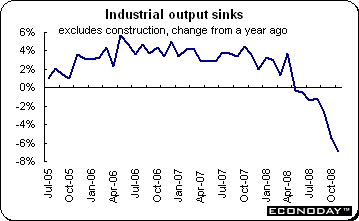 November industrial production sank by 1.6 percent and was down 7.7 percent when compared with last year. Industrial production declined by 1.2 percent in October. With the exception of non-durables where output edged up 0.1 percent on the month, production fell in all of the major categories. The largest drop was in intermediates (down 2.8 percent) but durable consumer goods (down 2.4 percent) were not far behind. Activity in capital goods (down 1.8 percent) and energy (down 1.4 percent) were also significantly down on the month. Output was down in most EMU members with just Germany (0.6 percent), Ireland (10.2 percent) and Luxembourg (3.3 percent) posting gains. Among the other larger EMU states, production fell 2.4 percent in France, 2.3 percent in Italy and 2.2 percent in Spain. November industrial production sank by 1.6 percent and was down 7.7 percent when compared with last year. Industrial production declined by 1.2 percent in October. With the exception of non-durables where output edged up 0.1 percent on the month, production fell in all of the major categories. The largest drop was in intermediates (down 2.8 percent) but durable consumer goods (down 2.4 percent) were not far behind. Activity in capital goods (down 1.8 percent) and energy (down 1.4 percent) were also significantly down on the month. Output was down in most EMU members with just Germany (0.6 percent), Ireland (10.2 percent) and Luxembourg (3.3 percent) posting gains. Among the other larger EMU states, production fell 2.4 percent in France, 2.3 percent in Italy and 2.2 percent in Spain.
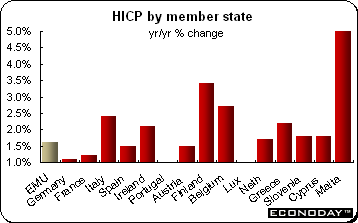 December harmonized index of consumer prices declined 0.1 percent and was up 1.6 percent when compared with last year. Core HICP, which excludes food, drink, tobacco and energy, was up 0.4 percent and was up 2.1 percent on the year. Omitting energy and unprocessed food, the annual rate eased to 2.1 percent while excluding just energy, prices were up 2.1 percent. Energy prices were down 4.7 percent on the month and 3.7 percent on the year. December harmonized index of consumer prices declined 0.1 percent and was up 1.6 percent when compared with last year. Core HICP, which excludes food, drink, tobacco and energy, was up 0.4 percent and was up 2.1 percent on the year. Omitting energy and unprocessed food, the annual rate eased to 2.1 percent while excluding just energy, prices were up 2.1 percent. Energy prices were down 4.7 percent on the month and 3.7 percent on the year.
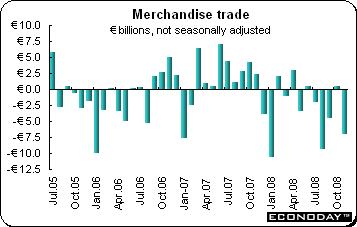 November seasonally adjusted merchandise trade deficit was €4.9 billion, up €2.8 billion from an upwardly revised October level. Both exports and imports dropped. Exports were down 4.7 percent on the month, their largest decline in at least eight years, and now stand 10.0 percent below a year ago. Imports dropped 2.5 percent and are now 4.0 percent lower from the same month last year. With one month of the year to go, the cumulative trade gap in 2008 was €32.1 billion compared with a surplus of €19.7 billion over the same period in 2007. On an unadjusted basis, the trade deficit was €7 billion. November seasonally adjusted merchandise trade deficit was €4.9 billion, up €2.8 billion from an upwardly revised October level. Both exports and imports dropped. Exports were down 4.7 percent on the month, their largest decline in at least eight years, and now stand 10.0 percent below a year ago. Imports dropped 2.5 percent and are now 4.0 percent lower from the same month last year. With one month of the year to go, the cumulative trade gap in 2008 was €32.1 billion compared with a surplus of €19.7 billion over the same period in 2007. On an unadjusted basis, the trade deficit was €7 billion.
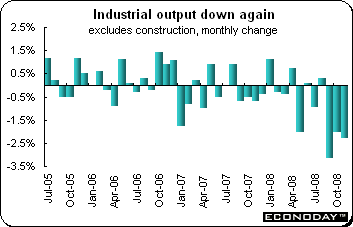 November industrial production was down 2.3 percent and plummeted 9.7 percent when compared with last year. The slump reflected hefty monthly declines in all the major production industries with the exception of consumer goods which just held onto their October level. Capital goods were down 4.5 percent, intermediates fell 2.8 percent and energy goods output was off 3.9 percent. Over the first 11 months of the year, total industrial production was 3.5 percent weaker than in the same period of 2007. November industrial production was down 2.3 percent and plummeted 9.7 percent when compared with last year. The slump reflected hefty monthly declines in all the major production industries with the exception of consumer goods which just held onto their October level. Capital goods were down 4.5 percent, intermediates fell 2.8 percent and energy goods output was off 3.9 percent. Over the first 11 months of the year, total industrial production was 3.5 percent weaker than in the same period of 2007.
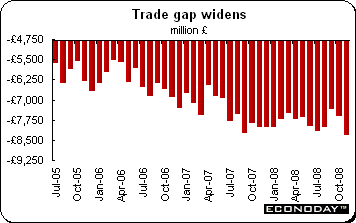 November merchandise trade deficit widened to a new record Stg8.3 billion. Despite the increase, the underlying trend is still seen as broadly flat with both nominal exports and imports flattening off in recent months. Even so, excluding oil and erratics the red ink still jumped by more than Stg1 billion to Stg7.9 billion. The deterioration in the global shortfall reflected a sharp worsening in net trade with non-EU countries where the deficit jumped to Stg5.3 billion from Stg4.4 billion in October. The shortfall with the EU bloc edged down to Stg3.0 billion. Total exports slumped 6 percent on the month due to a 12.5 percent nosedive in purchases from non-EU states. Exports to the EU were essentially flat. Overall imports were down a more subdued 2 percent including a 2.5 percent drop from the non-EU area. November merchandise trade deficit widened to a new record Stg8.3 billion. Despite the increase, the underlying trend is still seen as broadly flat with both nominal exports and imports flattening off in recent months. Even so, excluding oil and erratics the red ink still jumped by more than Stg1 billion to Stg7.9 billion. The deterioration in the global shortfall reflected a sharp worsening in net trade with non-EU countries where the deficit jumped to Stg5.3 billion from Stg4.4 billion in October. The shortfall with the EU bloc edged down to Stg3.0 billion. Total exports slumped 6 percent on the month due to a 12.5 percent nosedive in purchases from non-EU states. Exports to the EU were essentially flat. Overall imports were down a more subdued 2 percent including a 2.5 percent drop from the non-EU area.
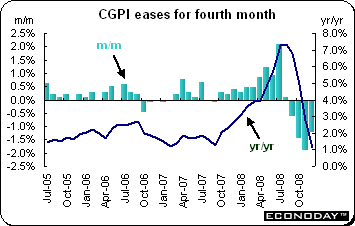 December corporate goods price index sank 1.2 percent but was up 1.1 percent when compared with last year. It was the fourth monthly decline in a row. Manufacturing prices dropped 1.3 percent after sinking 1.8 percent in November. On the year, manufacturing industry prices were up 1.3 percent, less than half of November’s revised 2.9 percent gain. Agricultural prices were up 1.1 percent on the month after dropping by 1.1 percent in November. On the year, agricultural prices were down 0.6 percent. The CGPI dropped 4.5 percent when compared with the previous quarter. The turn towards sinking prices reflects the surge in the yen and the concurrent slide in oil prices that has pulled import prices from a 27.2 percent increase in August to an 11.9 percent decline (yen basis) in December. December corporate goods price index sank 1.2 percent but was up 1.1 percent when compared with last year. It was the fourth monthly decline in a row. Manufacturing prices dropped 1.3 percent after sinking 1.8 percent in November. On the year, manufacturing industry prices were up 1.3 percent, less than half of November’s revised 2.9 percent gain. Agricultural prices were up 1.1 percent on the month after dropping by 1.1 percent in November. On the year, agricultural prices were down 0.6 percent. The CGPI dropped 4.5 percent when compared with the previous quarter. The turn towards sinking prices reflects the surge in the yen and the concurrent slide in oil prices that has pulled import prices from a 27.2 percent increase in August to an 11.9 percent decline (yen basis) in December.
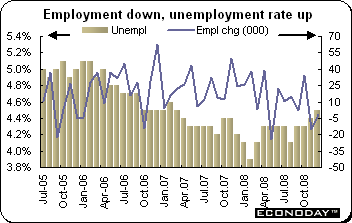 December employment edged down by 1,200. Full time employment was down by 43,900 jobs while part time employment increased by 42,800. Unemployment was up by 2,600 to 501,100. The number of persons looking for full time work increased by 2,600 to 349,400 and the number of persons looking for part time work remained steady at 151,700. The unemployment rate was 4.5 percent as expected, the highest since March 2007. The participation rate was 65 percent. It hit a record 65.5 percent in April before steadying at current levels, which suggests that pressure on the unemployment rate may be reduced as participation eases. December employment edged down by 1,200. Full time employment was down by 43,900 jobs while part time employment increased by 42,800. Unemployment was up by 2,600 to 501,100. The number of persons looking for full time work increased by 2,600 to 349,400 and the number of persons looking for part time work remained steady at 151,700. The unemployment rate was 4.5 percent as expected, the highest since March 2007. The participation rate was 65 percent. It hit a record 65.5 percent in April before steadying at current levels, which suggests that pressure on the unemployment rate may be reduced as participation eases.
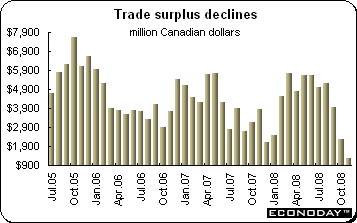 November merchandise trade surplus narrowed to just C$1.3 billion — the smallest in more than a decade. The deterioration reflected a monthly 6.8 percent decline in nominal exports that easily outpaced a 4.8 percent drop in imports. Within the former category, there was a hefty drop in energy sales (19.4 percent), compounded by sizeable declines in industrial goods & materials (7.4 percent), forestry products (5.9 percent) and other consumer goods (10.9 percent). The only gains of any note were in agriculture & fishing (2.3 percent) although machinery & equipment also crept higher (1.4 percent). Total export volumes fell 1.8 percent. Imports were dragged lower by a massive 36.5 percent nosedive in purchases of energy products. The decline here swamped much smaller drops in autos (4.5 percent) and industrial goods & materials (2.4 percent). Monthly increases were restricted to agriculture & fishing (1.1 percent), machinery & equipment (2.7 percent) and other consumer goods (2.8 percent). Import volumes were down 2.3 percent from October. The bilateral surplus with the U.S. shrank by C$1.4 billion to C$4.5 billion while the deficit with the EU widened marginally from C$0.5 billion to C$0.6 billion. November merchandise trade surplus narrowed to just C$1.3 billion — the smallest in more than a decade. The deterioration reflected a monthly 6.8 percent decline in nominal exports that easily outpaced a 4.8 percent drop in imports. Within the former category, there was a hefty drop in energy sales (19.4 percent), compounded by sizeable declines in industrial goods & materials (7.4 percent), forestry products (5.9 percent) and other consumer goods (10.9 percent). The only gains of any note were in agriculture & fishing (2.3 percent) although machinery & equipment also crept higher (1.4 percent). Total export volumes fell 1.8 percent. Imports were dragged lower by a massive 36.5 percent nosedive in purchases of energy products. The decline here swamped much smaller drops in autos (4.5 percent) and industrial goods & materials (2.4 percent). Monthly increases were restricted to agriculture & fishing (1.1 percent), machinery & equipment (2.7 percent) and other consumer goods (2.8 percent). Import volumes were down 2.3 percent from October. The bilateral surplus with the U.S. shrank by C$1.4 billion to C$4.5 billion while the deficit with the EU widened marginally from C$0.5 billion to C$0.6 billion.
Economic data continue to be universally dire regardless of the country of origin. Last week saw both exports and imports decline almost everywhere including China. And industrial production seemingly is falling into a bottomless pit.
The Bank of Canada announces its policy decision Tuesday morning. A rate cut of 50 basis points to 1 percent is expected. The Bank of Japan meets and announces on Thursday. With their policy interest rate already hovering over zero at 0.1 percent, no change is anticipated — but perhaps the Bank will introduce new measures to support markets. The UK will announce its first estimate of fourth quarter 2008 GDP.
And on Tuesday, after what seems like a very long transition, Barack Obama will take the oath of office as president of the United States.
| Central Bank activities |
|
| January 20 |
Canada |
Bank of Canada Policy Announcement |
| January 21,22 |
Japan |
Bank of Japan Policy Meeting |
|
|
|
| Other events |
|
|
| January 30 |
United States |
Inauguration of Barack Obama as President |
|
|
|
| The following indicators will be released this week... |
| Europe |
|
|
| January 20 |
Germany |
ZEW Business Survey (January) |
|
UK |
Consumer Price Index (December) |
| January 21 |
Germany |
Producer Price Index (December) |
|
Italy |
Merchandise Trade Balance (November) |
|
UK |
Labour Market Report (December) |
| January 22 |
France |
Consumption of Manufactured Goods (December) |
| January 23 |
UK |
Gross Domestic Product (Q4.08 preliminary) |
|
|
Retail Sales (December) |
|
|
|
| Asia/Pacific |
|
|
| January 20 |
Japan |
Tertiary Activity Report (November) |
| January 22 |
Japan |
Merchandise Trade Balance (December) |
| January 23 |
Japan |
All Industry Report (November) |
|
|
|
| Americas |
|
|
| January 20 |
Canada |
Manufacturing Shipments (November) |
| January 22 |
Canada |
Retail Sales (November) |
Anne D Picker is the author of International Economic Indicators and Central Banks.
|

![[Econoday]](images/econoday_logo_slim.gif)
![[Econoday]](images/logo.gif)


 Stocks were up Friday after declining for seven consecutive days. However, the FTSE, CAC and DAX were all down for the second week. Particularly hard hit were banking stocks as investors worried about mounting credit losses. Resource stocks did not escape either — energy companies declined as crude oil prices continued to drop. Disappointing economic data continued to pour in from the U.S and Europe. Even though the European Central Bank lowered its policy rate to 2.0 percent, the cut was in line with expectations and had little market impact.
Stocks were up Friday after declining for seven consecutive days. However, the FTSE, CAC and DAX were all down for the second week. Particularly hard hit were banking stocks as investors worried about mounting credit losses. Resource stocks did not escape either — energy companies declined as crude oil prices continued to drop. Disappointing economic data continued to pour in from the U.S and Europe. Even though the European Central Bank lowered its policy rate to 2.0 percent, the cut was in line with expectations and had little market impact.  As expected, the European Central Bank lowered its policy interest rate by 50 basis points to 2 percent. It was last at this level in November 2005 after which the ECB began its series of measured increases which culminated in July 2008 at 4.25 percent. The ECB began lowering rates in October 2008 when it participated with other major central banks in lowering interest rates at the height of the financial crisis. Since October, the ECB has lowered rates by 225 basis points.
As expected, the European Central Bank lowered its policy interest rate by 50 basis points to 2 percent. It was last at this level in November 2005 after which the ECB began its series of measured increases which culminated in July 2008 at 4.25 percent. The ECB began lowering rates in October 2008 when it participated with other major central banks in lowering interest rates at the height of the financial crisis. Since October, the ECB has lowered rates by 225 basis points.  Equity trading ended the week for the most part on a positive note Friday. However, all Asian/Pacific indexes were down for the week with the exception of the Shanghai Composite. News of an additional bailout for Bank of America and Congressional release of additional TARP funds boosted morale and stock prices. The yen eased and helped exporters’ stocks in Japan. However, earlier in the week, a continuing onslaught of gloomy economic data — especially from the U.S. — pushed equities down. On Thursday, awful U.S. retail sales data combined with sinking Japanese machine orders added to the gloom. And banking stocks slid on worries about steeper losses, while resource stocks tumbled on lower commodity and oil prices.
Equity trading ended the week for the most part on a positive note Friday. However, all Asian/Pacific indexes were down for the week with the exception of the Shanghai Composite. News of an additional bailout for Bank of America and Congressional release of additional TARP funds boosted morale and stock prices. The yen eased and helped exporters’ stocks in Japan. However, earlier in the week, a continuing onslaught of gloomy economic data — especially from the U.S. — pushed equities down. On Thursday, awful U.S. retail sales data combined with sinking Japanese machine orders added to the gloom. And banking stocks slid on worries about steeper losses, while resource stocks tumbled on lower commodity and oil prices.  Thailand’s central bank cut its interest rate more than expected for a second month after inflation cooled to the slowest pace in six years and political protests sent confidence plummeting to a record low. The Bank of Thailand lowered its one-day bond repurchase rate by 75 basis points to 2 percent. Thailand joins Indonesia, South Korea and Taiwan in cutting borrowing costs this month as the global recession curtails demand for Asian exports. Exports, which make up 70 percent of the economy, slid in November from a year earlier for the first time since March 2002, sinking 18 percent.
Thailand’s central bank cut its interest rate more than expected for a second month after inflation cooled to the slowest pace in six years and political protests sent confidence plummeting to a record low. The Bank of Thailand lowered its one-day bond repurchase rate by 75 basis points to 2 percent. Thailand joins Indonesia, South Korea and Taiwan in cutting borrowing costs this month as the global recession curtails demand for Asian exports. Exports, which make up 70 percent of the economy, slid in November from a year earlier for the first time since March 2002, sinking 18 percent.  The yen was up and euro down until Friday, when investors rediscovered their appetite for risk and bought equities. The dollar continues to be the safe haven of choice when equities are as volatile as they have been. The euro has been declining primarily because the financial markets think the European Central Bank is behind the curve in cutting interest rates given the floundering economy. Eurozone rates remain among the highest among the world’s major industrialized countries. The ECB rate of 2 percent compares with 1.5 percent in the UK and a range of zero to 0.25 percent in the U.S. The euro also has been affected by the wider sovereign bond spreads for countries such as Spain, Greece, Portugal and Ireland when compared with Germany.
The yen was up and euro down until Friday, when investors rediscovered their appetite for risk and bought equities. The dollar continues to be the safe haven of choice when equities are as volatile as they have been. The euro has been declining primarily because the financial markets think the European Central Bank is behind the curve in cutting interest rates given the floundering economy. Eurozone rates remain among the highest among the world’s major industrialized countries. The ECB rate of 2 percent compares with 1.5 percent in the UK and a range of zero to 0.25 percent in the U.S. The euro also has been affected by the wider sovereign bond spreads for countries such as Spain, Greece, Portugal and Ireland when compared with Germany.  November
November  December
December  November seasonally adjusted
November seasonally adjusted  November
November  November
November  December
December  December
December  November
November